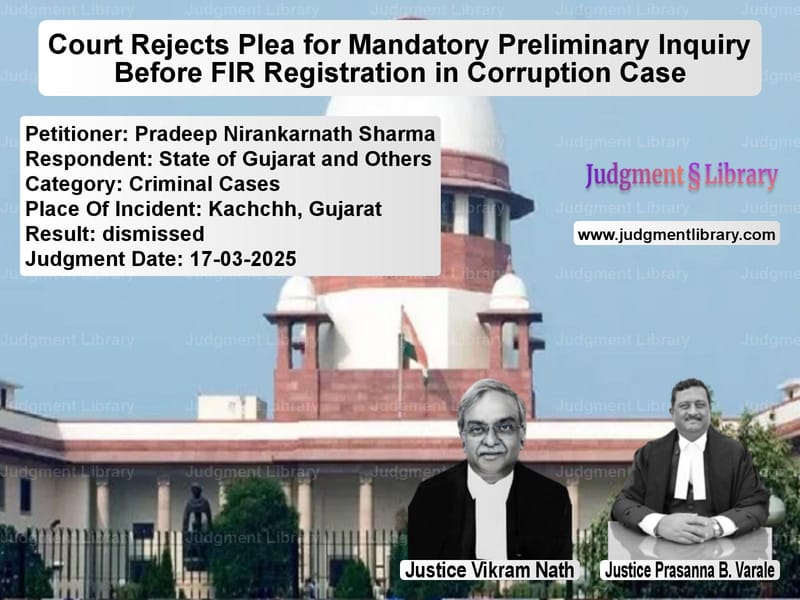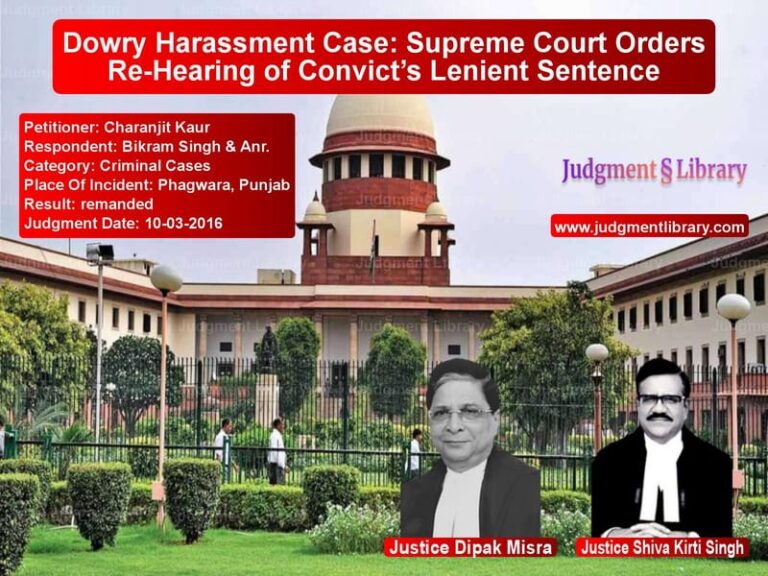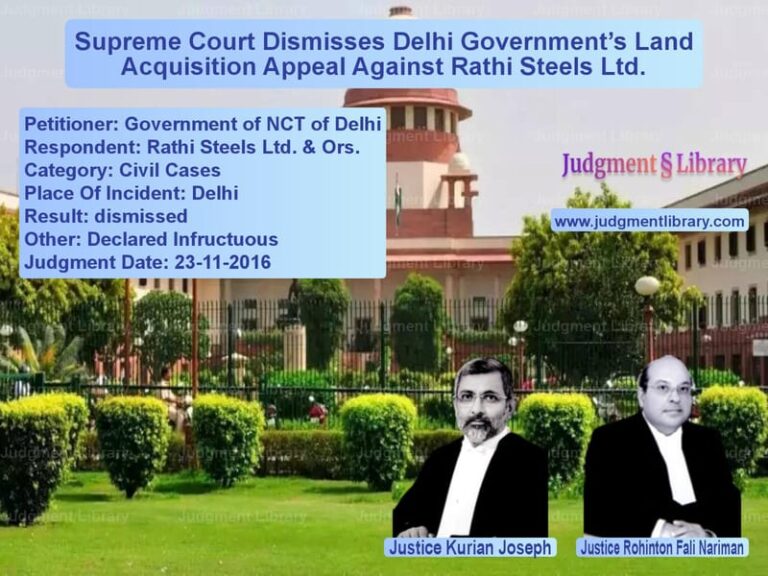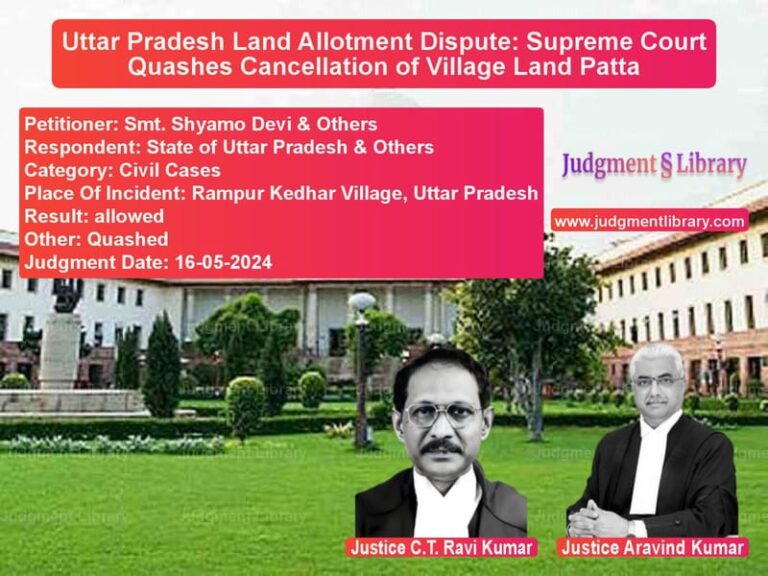Court Rejects Plea for Mandatory Preliminary Inquiry Before FIR Registration in Corruption Case
The Supreme Court of India recently delivered a crucial judgment in the case of Pradeep Nirankarnath Sharma v. State of Gujarat, addressing the question of whether a preliminary inquiry is mandatory before registering an FIR in cases involving allegations of abuse of official position. The judgment, delivered on March 17, 2025, upheld the Gujarat High Court’s decision and ruled against the appellant, a retired IAS officer, who sought relief from multiple FIRs lodged against him.
The Court firmly reiterated that law enforcement agencies are duty-bound to register an FIR when information regarding a cognizable offense is received and that the demand for a mandatory preliminary inquiry before every FIR registration is legally unsustainable.
Background of the Case
The case originates from alleged irregularities in land allotments carried out by the appellant, Pradeep Nirankarnath Sharma, during his tenure as the Collector of Kachchh District, Gujarat (2003–2006). The appellant faced multiple FIRs, all alleging abuse of official position, corruption, and financial irregularities. The first FIR was registered in 2010, and several more followed as investigations continued.
As the legal battle progressed, the appellant remained in judicial custody while multiple cases against him were pending in different courts. Seeking relief, he approached the Gujarat High Court through a writ petition under Articles 14, 20, 21, and 226 of the Indian Constitution. The primary request was for a writ of mandamus directing law enforcement agencies to conduct a preliminary inquiry before registering any further FIRs against him.
Petitioner’s Arguments
The appellant, represented by senior counsel Mr. Kapil Sibal, argued:
- The registration of successive FIRs against him, particularly after securing bail in earlier cases, was a deliberate attempt to harass him and ensure his continued incarceration.
- Under the Supreme Court’s precedent in Lalita Kumari v. Government of Uttar Pradesh (2014), a preliminary inquiry should have been conducted before registering any further FIRs against him.
- The FIRs were registered without due diligence and violated fundamental rights under Articles 14 and 21.
- As a retired IAS officer, his actions as Collector were performed in his official capacity, and therefore, any criminal allegations should have been preceded by a structured legal review.
The petitioner’s counsel emphasized, “The repeated registration of FIRs, without a preliminary inquiry to verify the existence of a cognizable offense, is a clear abuse of legal provisions and violates the appellant’s fundamental right to liberty.”
Respondent’s Arguments
The State of Gujarat, represented by Solicitor General Mr. Tushar Mehta, strongly opposed the appeal and submitted:
- The law does not mandate a preliminary inquiry in cases where clear allegations of cognizable offenses exist.
- The Supreme Court’s judgment in Lalita Kumari does not support the appellant’s claims, as it only permits preliminary inquiries in limited categories of cases, such as medical negligence and family disputes.
- The appellant’s request, if granted, would set a dangerous precedent where government officials accused of corruption could evade immediate investigation.
The respondent’s counsel stated, “The demand for a preliminary inquiry before FIR registration in corruption cases is contrary to established legal principles. It would amount to granting blanket protection to officials accused of misusing public office.”
Supreme Court’s Ruling
The Supreme Court bench, comprising Justices Vikram Nath and Prasanna B. Varale, rejected the appellant’s plea. The Court reaffirmed the principles set forth in Lalita Kumari and ruled that a preliminary inquiry is not mandatory in cases where clear allegations of cognizable offenses exist.
The Court observed:
“Once a complaint discloses the commission of a cognizable offense, the police authorities are under a statutory obligation to register an FIR under Section 154 of the Code of Criminal Procedure.”
Addressing the appellant’s concerns about successive FIRs, the bench clarified:
“The appellant’s contention that multiple FIRs have been registered against him with an ulterior motive is a matter that can be addressed through legal remedies, such as quashing of frivolous FIRs under Section 482 CrPC, rather than mandating a preliminary inquiry in every instance.”
The Court further stated:
“The law does not provide a pre-FIR hearing to the accused, nor can such a requirement be introduced through judicial intervention. Doing so would hinder the investigation process and create an unjustified legal hurdle in cases involving serious offenses like corruption.”
Key Legal Takeaways
- Mandatory FIR Registration: If a complaint prima facie discloses a cognizable offense, police authorities have no discretion to withhold FIR registration.
- Limited Scope for Preliminary Inquiry: Preliminary inquiries are only required in select categories of cases (e.g., medical negligence, commercial disputes), and not where allegations involve clear cognizable offenses.
- Alternative Remedies Available: Accused persons have legal avenues such as filing for quashing of FIRs, seeking bail, or contesting charges during trial.
Final Judgment
The Supreme Court upheld the Gujarat High Court’s decision and dismissed the appeal. The judgment concluded:
“This Court finds no merit in the present appeal. The request for a mandatory preliminary inquiry before registering an FIR in corruption cases is legally untenable and contrary to the statutory framework.”
However, the Court clarified that the appellant retains the right to seek redressal under the appropriate legal provisions, including the right to challenge individual FIRs through quashing petitions.
Petitioner Name: Pradeep Nirankarnath Sharma.Respondent Name: State of Gujarat and Others.Judgment By: Justice Vikram Nath, Justice Prasanna B. Varale.Place Of Incident: Kachchh, Gujarat.Judgment Date: 17-03-2025.
Don’t miss out on the full details! Download the complete judgment in PDF format below and gain valuable insights instantly!
Download Judgment: pradeep-nirankarnath-vs-state-of-gujarat-and-supreme-court-of-india-judgment-dated-17-03-2025.pdf
Directly Download Judgment: Directly download this Judgment
See all petitions in Fraud and Forgery
See all petitions in Extortion and Blackmail
See all petitions in Money Laundering Cases
See all petitions in Judgment by Vikram Nath
See all petitions in Judgment by Prasanna Bhalachandra Varale
See all petitions in dismissed
See all petitions in supreme court of India judgments March 2025
See all petitions in 2025 judgments
See all posts in Criminal Cases Category
See all allowed petitions in Criminal Cases Category
See all Dismissed petitions in Criminal Cases Category
See all partially allowed petitions in Criminal Cases Category







